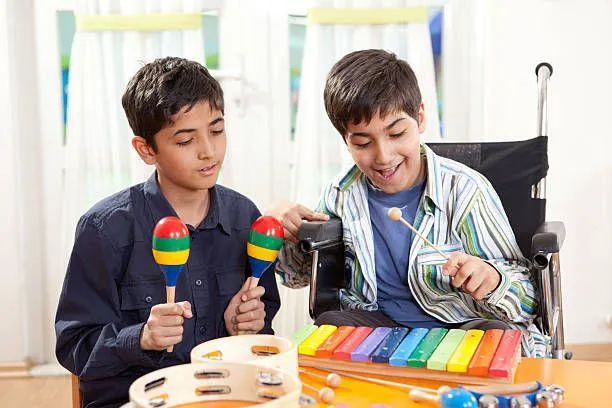We Empower...
Parents, Children, and Adults to develop emotional awareness, improve social skills, and gain effective coping skills resulting in improved peer relationships, increased family harmony, and a calmer & more relaxed demeanor.
Live outside of Boise?

About Boise Music Therapy Company
Hi, I'm Samantha Foote, the Founder of Boise Music Therapy Company.
I am a board-certified music therapist, a Positive Discipline Parent Educator, and a registered Music Together teacher.
I obtained a Bachelor of Science degree from Utah State University and completed my Masters of Music with a specialization in Music Therapy degree from Colorado State University.
I am a Neurological Music Therapy Fellow and a Dialectical Behavior Therapy-informed Music Therapist.
When I am not working, I enjoy spending time with my husband, children, and extended family.
We enjoy fishing, camping, and other outdoor adventures.
Services

Music Therapy
Music Therapy is the clinical and evidence-based use of music interventions to accomplish individualized goals within a therapeutic relationship by a credentialed professional who has completed an approved music therapy program.
Behavior Intervention
Behavior Intervention focuses on teaching children skills they need to be successful in their home, school, and community. Skills worked on may include social/emotional skills, cognitive skills, daily living skills, and others.


Parent Support
We provide support to Parents of children with Neurodivergency in the form of a membership. Launching December 14th 2023.
Podcast
Every Brain is Different," the podcast designed to support parents navigating the journey of raising a neurodivergent child. Join us as we delve deep into crucial topics like ADHD, Autism, sensory challenges, and more. Discover practical tips, personal stories, and expert insights that empower and uplift both you and your child. Join our community of like-minded individuals celebrating neurodiversity. Let's explore, learn, and embrace the uniqueness of every brain - together.

Services

Music Therapy
Music Therapy is the clinical and evidence-based use of music interventions to accomplish individualized goals within a therapeutic relationship by a credentialed professional who has completed an approved music therapy program.
Behavior Intervention
Behavior Intervention focuses on teaching children skills they need to be successful in their home, school, and community. Skills worked on may include social/emotional skills, cognitive skills, daily living skills, and others.


Parenting Support
We provide support to Parents of children with Neurodivergency (and Providers) in the form of a membership.
Every Brain Is Different Podcast
"Every Brain is Different," the podcast designed to support parents navigating the journey of raising a neurodivergent child. Join us as we delve deep into crucial topics like ADHD, Autism, sensory challenges, and more. Discover practical tips, personal stories, and expert insights that empower and uplift both you and your child. Join our community of like-minded individuals celebrating neurodiversity. Let's explore, learn, and embrace the uniqueness of every brain - together.
Customer Reviews
★★★★★
"Our favorite music therapist, Gabby, from Boise Music Therapy Company was able to return to Aspen Lane and sing with our residents! It’s been over a year since we’ve been able to have her in the community and we are so grateful to have her back! Lots of singing, smiling, and dancing happening today at Aspen Valley!" - May 17, 2021
Aspen Valley, Senior Living
★★★★★
"Samantha is a warm, enthusiastic instructor. I’ve participated in her drum circles where I enjoyed the freedom to express through music without judgment and to try a variety of instruments. It’s fascinating to experience the power and energy in each group and notice how each experience is unique. I recommend you give her a try and see what Boise Music Therapy can do for you and your family."
Mary Ann Hill
Client Wins
★★★★★
An 8-year-old client came to me crying because all of his classmates had a best friend, except him. We created a plan to help him develop the emotional intelligence and social skills needed to be confident in finding friends. We did this using music therapy interventions. For example, we would focus on one emotion, happy, and ask him to play music that sounded happy. It took lots of work to help him gain confidence, but with lots of encouragement, he learned how to read emotions in other people and gain needed social skills. The best day was when he came to therapy and excitedly shared that he had made a friend in his class. I cried that day.
★★★★★
A client with a traumatic brain injury could not process spoken questions. When the questions were sang to him he could process and answer them. I worked with a speech therapist and the client to help him learn to answer spoken questions. First we used picture cards and music to help him and then slowly backed off the music and cards until he could answer questions that were spoken to him.
FAQS
What can we expect from Music Therapy?
Boise Music Therapy Company offers music therapy services and piano/guitar lessons to people of all ages and abilities, parent coaching, and Music Together classes. Not only do we take private pay clients, but we also work with state approved clients.
What's the first step?
Our first step is to schedule a consultation with us so that we can identify the needs and goals of the client. We will conduct an assessment, complete the necessary paperwork that the state requires (if applicable) and schedule appointments to get started.
How can I monitor the performance of my practice's billing and coding with your services?
We provide transparent reporting and performance analytics to keep you informed about your practice's financial health. Our customized reports offer insights into key metrics, such as claim submission and reimbursement timelines, claim denials, and revenue trends. You can access these reports in real-time through our secure client portal. Our team is also available to review these reports with you, offering guidance on areas for improvement and optimization. We aim to provide you with the tools and information needed to make informed decisions to enhance your practice's financial performance.







